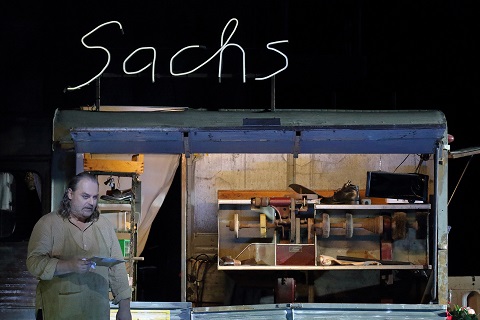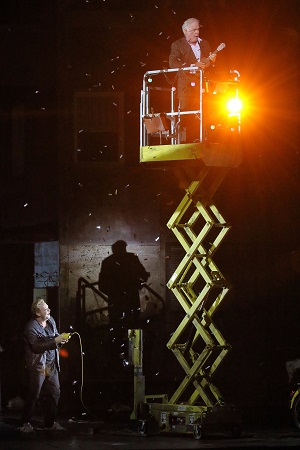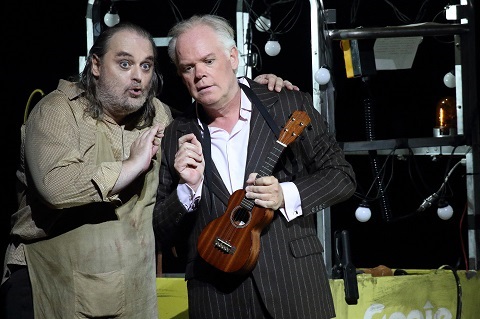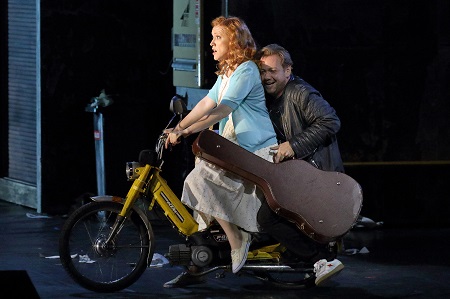
01 Aug 2019
Die Meistersinger von Nürnberg in Munich
‘Es klang so neu und war doch ein bißchen alt’?
English Touring Opera are delighted to announce a season of lyric monodramas to tour nationally from October to December. The season features music for solo singer and piano by Argento, Britten, Tippett and Shostakovich with a bold and inventive approach to making opera during social distancing.
This tenth of ten Live from London concerts was in fact a recorded live performance from California. It was no less enjoyable for that, and it was also uplifting to learn that this wasn’t in fact the ‘last’ LfL event that we will be able to enjoy, courtesy of VOCES8 and their fellow vocal ensembles (more below …).
Ever since Wigmore Hall announced their superb series of autumn concerts, all streamed live and available free of charge, I’d been looking forward to this song recital by Ian Bostridge and Imogen Cooper.
The Sixteen continues its exploration of Henry Purcell’s Welcome Songs for Charles II. As with Robert King’s pioneering Purcell series begun over thirty years ago for Hyperion, Harry Christophers is recording two Welcome Songs per disc.
Although Stile Antico’s programme article for their Live from London recital introduced their selection from the many treasures of the English Renaissance in the context of the theological debates and upheavals of the Tudor and Elizabethan years, their performance was more evocative of private chamber music than of public liturgy.
In February this year, Albanian soprano Ermonela Jaho made a highly lauded debut recital at Wigmore Hall - a concert which both celebrated Opera Rara’s 50th anniversary and honoured the career of the Italian soprano Rosina Storchio (1872-1945), the star of verismo who created the title roles in Leoncavallo’s La bohème and Zazà, Mascagni’s Lodoletta and Puccini’s Madama Butterfly.
Evidently, face masks don’t stifle appreciative “Bravo!”s. And, reducing audience numbers doesn’t lower the volume of such acclamations. For, the audience at Wigmore Hall gave soprano Elizabeth Llewellyn and pianist Simon Lepper a greatly deserved warm reception and hearty response following this lunchtime recital of late-Romantic song.
Collapsology. Or, perhaps we should use the French word ‘Collapsologie’ because this is a transdisciplinary idea pretty much advocated by a series of French theorists - and apparently, mostly French theorists. It in essence focuses on the imminent collapse of modern society and all its layers - a series of escalating crises on a global scale: environmental, economic, geopolitical, governmental; the list is extensive.
For this week’s Live from London vocal recital we moved from the home of VOCES8, St Anne and St Agnes in the City of London, to Kings Place, where The Sixteen - who have been associate artists at the venue for some time - presented a programme of music and words bound together by the theme of ‘reflection’.
'Such is your divine Disposation that both you excellently understand, and royally entertaine the Exercise of Musicke.’
Amongst an avalanche of new Mahler recordings appearing at the moment (Das Lied von der Erde seems to be the most favoured, with three) this 1991 Mahler Second from the 2nd Kassel MahlerFest is one of the more interesting releases.
‘And there was war in heaven: Michael and his angels fought against the dragon; and the dragon fought and his angels, And prevailed not; neither was their place found any more in heaven … that old serpent … Satan, which deceiveth the whole world: he was cast out into the earth, and his angels were cast out with him.’
If there is one myth, it seems believed by some people today, that probably needs shattering it is that post-war recordings or performances of Wagner operas were always of exceptional quality. This 1949 Hamburg Tristan und Isolde is one of those recordings - though quite who is to blame for its many problems takes quite some unearthing.
There was never any doubt that the fifth of the twelve Met Stars Live in Concert broadcasts was going to be a palpably intense and vivid event, as well as a musically stunning and theatrically enervating experience.
‘Love’ was the theme for this Live from London performance by Apollo5. Given the complexity and diversity of that human emotion, and Apollo5’s reputation for versatility and diverse repertoire, ranging from Renaissance choral music to jazz, from contemporary classical works to popular song, it was no surprise that their programme spanned 500 years and several musical styles.
The Academy of St Martin in the Fields have titled their autumn series of eight concerts - which are taking place at 5pm and 7.30pm on two Saturdays each month at their home venue in Trafalgar Square, and being filmed for streaming the following Thursday - ‘re:connect’.
The London Symphony Orchestra opened their Autumn 2020 season with a homage to Oliver Knussen, who died at the age of 66 in July 2018. The programme traced a national musical lineage through the twentieth century, from Britten to Knussen, on to Mark-Anthony Turnage, and entwining the LSO and Rattle too.
With the Live from London digital vocal festival entering the second half of the series, the festival’s host, VOCES8, returned to their home at St Annes and St Agnes in the City of London to present a sequence of ‘Choral Dances’ - vocal music inspired by dance, embracing diverse genres from the Renaissance madrigal to swing jazz.
Just a few unison string wriggles from the opening of Mozart’s overture to Le nozze di Figaro are enough to make any opera-lover perch on the edge of their seat, in excited anticipation of the drama in music to come, so there could be no other curtain-raiser for this Gala Concert at the Royal Opera House, the latest instalment from ‘their House’ to ‘our houses’.
"Before the ending of the day, creator of all things, we pray that, with your accustomed mercy, you may watch over us."

‘Es klang so neu und war doch ein bißchen alt’?
A little more than three years after first seeing David Bösch’s (then new) production of Die Meistersinger von Nürnberg, I looked forward to making its reacquaintance. It struck me then as being, alongside Stefan Herheim’s staging (seen in both Salzburg and Paris ), one of the most significant additions to the repertory. There has not, frankly, been much in the way of competition, offerings from Barrie Kosky and Andrea Moses in particular having proved well-nigh disastrous. How did Bösch’s staging measure up now? In some ways, well. It is certainly more coherent than either of the last too named. However, a good deal of what had made it distinctive, and had decided me to include it in this essay , had disappeared, presumably a casualty of the lack of rehearsal for a brief festival revival. Two at least of its most distinguishing characteristics, the violence at the heart of a reconstructed, provincial ‘community’, and a welcome feminist conception of Eva, had respectively been toned down (more likely, perhaps, unknowingly omitted) and jettisoned. A great pity, that, though perhaps not unlikely in the circumstances: a reminder, at least, that what we see in June and July is not always so very close to what was originally envisaged (and seen).
I shall try, though, not to dwell unduly on what might have been, on what had been: anyone interested in the 2016 first performances, including Jonas Kaufmann, may consult the initial review . The importance of (multi-)media in transmission of music, art more generally, and indeed life, such as it is, more generally, continues to register, for instance in video footage of plans, instructions, flowcharts, and sketches: there is a thin line, perhaps, between the nerd and the pedant. Press coverage of the mastersong competition flicks through, also on video, when the masters first enter, an important point the centenary 1868-1968 (the first year, of course, the work’s premiere, the second year not an unimportant year in the history of the Left), in which Veit Pogner had claimed the prize. That generation has a great deal to answer for, many of us would argue; at least we were spared the sight of Antony Charles Lynton Blair et al. strutting their wares ‘just more one time’. At any rate, this contest for a bartered bride, as much sport as art, and heavily sponsored by ‘Meister Bräu’’, sums things up nicely. Sport, of course, always gets off lightly, entwining nationalism (and/or localism) and toxic masculinity, as it does. No one dare accuse it, though, given the media interests at stake. (Consider British liberals’ obsession with the appalling 2012 Olympics.) Contrast that with the laudable attempts at self-criticism of most important artistic production since the Second World War. That contrast certainly seems implicit here, although the shock violence initially administered by Beckmesser as Marker to Walther now seems ‘mere’ entertainment: a flashing of lights rather than electric shock. Perhaps, though, as everything becomes more mediated, as Trump, Johnson, and other fascists star in their own game show, impervious to political criticism and activity, there is something to be said for such a degeneration too.

The moment of revolt - or is it further repression - comes through more fitfully in the second act than previously. Can one make a Marcusian case for the apprentices’ thuggery? Probably. Should one? Difficult to say. (One might say the same for Andreas Baader, after all, or the original, far more lethal, RAF.) But the chemistry between Sachs and Eva, the plausibility of their romance, has struck earlier on a very different note. What often seems dramaturgically unconvincing, even odd, here seems quite natural, for want of a better word. Whether that were the case in 2016, I cannot remember, although the artists, Wolfgang Koch and Sara Jakubiak, were the same. Their performances all round were outstanding. If the extremely powerful moment of Eva’s rejection - of the contest - in the third act now seemed to be missing, Jakubiak offered intelligent, vocally alluring singing, as well as accomplished acting. So too did Koch, of course, with a wisdom born of experience not only as Sachs but in many other roles.
Let us return, however, to the production, to the third act. Sachs’s neon-lit van having lost two of its letters, now sighs, in Schopenhauerian style, ‘ACH’. More might have been made of that implication, especially in light of loss of the provincial violence that initially made this act so threatening, so disconcerting. There remain hints, perhaps most notably in the apprentices’ behaviour towards David, homophobic bullying still, I think, implicit. But they are only hints, and would perhaps mostly be noticed by those who had seen the production before. Beckmesser’s return at the very close, to shoot himself, makes far less sense in the absence of such build-up. A pity, as I said, although perhaps there is something to be salvaged in reflection upon continuing degeneration into entertainment.

Musically, standards remained high: very high indeed in the case of Kirill Petrenko, the orchestra, and chorus. Of Wagner’s works, this seems very much Petrenko’s best, at least in my experience. Formidable technical challenges - simply marshalling those forces, in a far from simple staging - never seemed to register, however great the art in concealing that art (a Meistersinger virtue in itself). Wagner’s score flowed with all the inevitability of a mighty river. That is never, though, at the expense of detail, overt contrapuntal (and other) virtuosity in which the composer sometimes revels portrayed lovingly, comprehendingly, without degenerating into mere virtuosity itself. It was, moreover, not only in the counterpoint and chorales that Wagner’s Bachian debt was repaid. Wagner’s writing for oboes in particular, played as superlatively as it was here, gave pause to all manner of thoughts concerning connection with Bach’s sacred music too. (Now might we hear a St Matthew Passion or B minor Mass from Petrenko? Even some of the cantatas? Too much to hope? If so, it is surely a victimless crime.)

Kaufmann had withdrawn earlier in the week, replaced at very short notice as Walther by Daniel Kirch. There was considerable promise in his performance, although he tired towards the end. At his best in the second act, Kirch showed himself capable of a detailed, variegated performance, both verbally and musically. Earlier on, perhaps still finding his way around the Nationaltheater, he had a tendency to force his voice somewhat, almost as if a Siegfried. There remained, though, much to admire. Martin Gantner’s Beckmesser was first-rate: a sung Malvolio of the highest quality. Allan Clayton’s David proved equally detailed and finely sung, well matched to Okka von der Damerau’s spirited Magdalena. Christof Fischesser made for an uncommonly youthful, virile Pogner, and Milan Siljanov’s Night Watchman suggested a singer from whom we shall be hearing much more soon. More than enough, then, to be going on with until the full revival Bösch’s production unquestionably merits.
Mark Berry
Wagner: Die Meistersinger von Nürnberg
Walther von Stolzing - Daniel Kirch, Eva - Sara Jakubiak, Magdalene - Okka von der Damerau, David - Allan Clayton, Hans Sachs - Wolfgang Koch, Sixtus Beckmesser - Martin Gantner, Veit Pogner - Christof Fischesser, Fritz Kothner - Michael Kupfer-Radecky, Kunz Vogelgesang - Kevin Conners, Konrad Nachtigall - Christian Rieger, Ulrich Eißlinger - Dean Power, Hermann Ortel - Levente Páll, Balthasar Zorn - Ulrich Reß, Augustin Moser - Thorsten Scharnke, Hans Foltz - Roman Astakhov, Hans Schwarz - Peter Lobert, Night Watchman - Milan Siljanov; Director - David Bösch, Conductor - Kirill Petrenko, Set designs - Patrick Bannwart, Costumes - Meentje Nielsen, Video - Falko Herold, Lighting - Michael Bauer, Dramaturgy - Rainer Karlitschek, Revival director - Theresa Schlichtherle, Chorus, Extra Chorus, Orchestra of the Bavarian State Opera.
Nationaltheater, Munich; 27th July 2019.